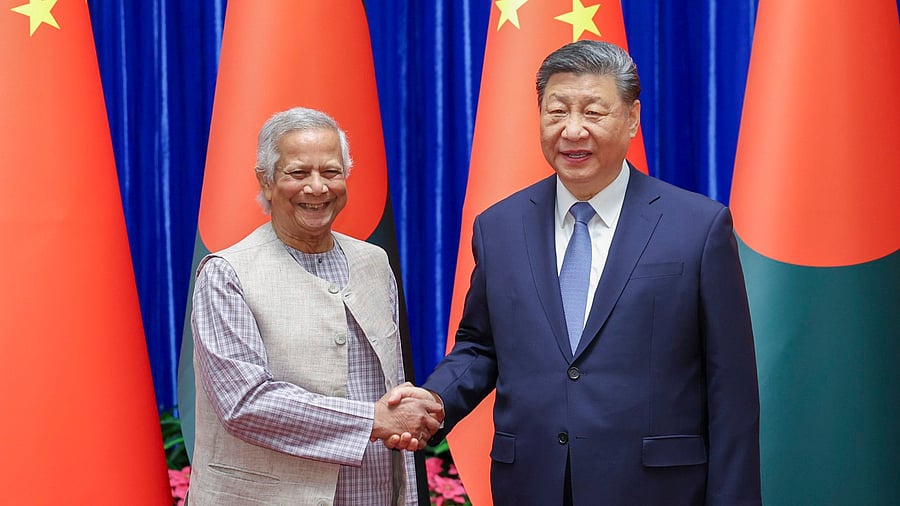
Chinese President Xi Jinping during a meeting with Chief Adviser of Bangladesh Muhammad Yunus.
Credit: PTI Photo
NEW DELHI: Bangladesh has invited China to invest in a river conservation project close to the ‘Chicken’s Neck’ corridor – the link between India’s mainland and its seven northeastern States.
The head of Bangladesh’s interim government, Muhammad Yunus, met Chinese President Xi Jinping in Beijing on Friday. Yunus invited China’s state-owned entities to participate in the comprehensive management and restoration project of Teesta, a transboundary river that flows from India to Bangladesh. Dhaka sought Beijing’s support even as New Delhi had, a few months back, agreed to support the project and send a technical team to study it further.
Yunus also conveyed to Xi that China’s state-owned companies could participate in projects such as the modernization and expansion of Mongla Port facilities in Bangladesh. Dhaka also conveyed its willingness to work with Beijing to promote the construction of the Chittagong China Economic and Industrial Park near the Southeastern Coast of Bangladesh, according to a joint statement issued after the Yunus-Xi meeting.
Dhaka had in 2017 agreed to let New Delhi use the ports in Chittagong and Mongla for the transportation of goods to and from India.
“China supports Bangladesh in safeguarding its national sovereignty, independence and territorial integrity and exploring a development path that suits its national conditions,” Xi told Yunus.
Yunus told Xi that Dhaka would welcome more Chinese companies to invest in Bangladesh and help promote the economic transformation of Bangladesh.
Teesta is a river that originates in Sikkim and flows through West Bengal in India before entering Bangladesh.
A move by New Delhi and Dhaka to clinch a water-sharing deal remained stalled for the past several years as West Bengal Chief Minister Mamata Banerjee refrained from giving her consent, stating that such a pact would result in water scarcity in the northern region of the state and hit the farmers hard.
New Delhi earlier conveyed to Dhaka its concerns over China’s role in the proposed project for conservation and comprehensive management of Teesta, as it would allow the communist country to deploy its personnel so close to the Chicken’s Neck Corridor or Siliguri Corridor – the vital link between seven northeastern states and the mainland of India.
When Prime Minister Narendra Modi had hosted his then-counterpart, Sheikh Hasina, in New Delhi in June 2024, India had pledged financial support for the project to persuade Bangladesh to reject China’s offer of a $ 1 billion soft loan for the project. Hasina’s Awami League government, however, fell just a few weeks later in the wake of a mass protest against police crackdown on students and youths agitating against reservation in government recruitment. She flew to India on August 5, 2024, and, three days later, Yunus took over as the chief advisor of the interim government of Bangladesh.
India’s protest against the persecution of Hindus and other minority communities in Bangladesh after the change of government in the neighbouring nation, India’s silence over the request by the interim government of Bangladesh for extradition of Sheikh Hasina or its protest against her virtual addresses delivered from India on recent developments in Bangladesh, including the vandalism and demolition of the historic residence of her father and the founder of the nation Bangabandhu Sheikh Mujibur Rahman, emerged as irritants in the bilateral relations.
New Delhi has been concerned over China’s bid to drag Bangladesh into its orbit of geopolitical influence, including through support for development projects and defence cooperation. Bangladesh bought two submarines from China in 2016. China is also building a submarine base at Pekua in Cox’s Bazar in Bangladesh, much to the unease for the security establishment of India.
